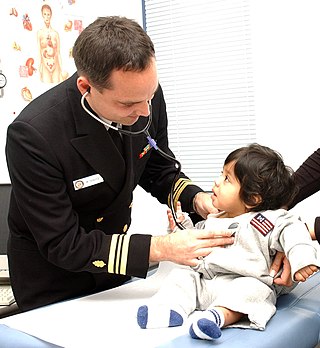
A registered nurse (RN) is a nurse who has graduated or successfully passed a nursing program from a recognized nursing school and met the requirements outlined by a country, state, province or similar government-authorized licensing body to obtain a nursing license. An RN's scope of practice is determined by legislation, and is regulated by a professional body or council.
The School of Nursing is the graduate school of nursing at Columbia University in the Washington Heights neighborhood of Manhattan, New York City. Founded in 1892, it stands as one of the oldest nursing schools in the United States.
Pediatric nursing is part of the nursing profession, specifically revolving around the care of neonates and children up to adolescence. The word, pediatrics, comes from the Greek words 'paedia' (child) and 'iatrike' (physician). 'Paediatrics' is the British/Australian spelling, while 'pediatrics' is the American spelling.

Yale School of Nursing (YSN) is the nursing school of Yale University, located in West Haven, Connecticut. It is among the top 20 graduate schools in the country, according to the latest rankings by U.S. News & World Report (2017). In addition to the top 20 tier overall ranking, the school’s midwifery specialty had the second-highest score nationally as ranked by peer institutions. Yale School of Nursing’s psychiatric-mental health specialty ranked sixth, and its pediatric nurse practitioner specialty came in at fifth in a three-way tie. Yale’s School of Nursing remains among the most selective in the nation, with only 20% of applicants estimated to be accepted.

A nurse practitioner (NP) is an advanced practice registered nurse and a type of mid-level practitioner. NPs are trained to assess patient needs, order and interpret diagnostic and laboratory tests, diagnose disease, formulate and prescribe medications and treatment plans. NP training covers basic disease prevention, coordination of care, and health promotion. One study found that although reasons for referrals to specialists are similar for both physicians and NPs, the quality of documentation in the referrals may be lower for NPs.
An advanced practice nurse (APN) is a nurse with post-graduate education and training in nursing. Nurses practicing at this level may work in either a specialist or generalist capacity. APNs are prepared with advanced didactic and clinical education, knowledge, skills, and scope of practice in nursing.
A Master of Science in Nursing (MSN) is an advanced-level postgraduate degree for registered nurses and is considered an entry-level degree for nurse educators and managers. The degree also may prepare a nurse to seek a career as a nurse administrator, health policy expert, or clinical nurse leader. The MSN may be used as a prerequisite for doctorate-level nursing education, and used to be required to become an advanced practice registered nurse such as a nurse practitioner, clinical nurse specialist, nurse anesthetist, or nurse midwife.
The Doctor of Nursing Practice (DNP) is a professional degree in nursing popular in the United States.
Nursing credentials and certifications are the various credentials and certifications that a person must have to practice nursing legally. Nurses' postnominal letters reflect their credentials—that is, their achievements in nursing education, licensure, certification, and fellowship. The letters usually appear in the following order:
Frontier Nursing University is a private graduate school of nursing in Versailles, Kentucky. It was established by the Frontier Nursing Service in 1939 as the Frontier School of Midwifery and Family Nursing.
The University of Virginia School of Nursing, established in 1901, is a school of nursing education. It has an enrollment of approximately 800 students, and is consistently rated in the top 4% of U.S. nursing schools. After the retirement of Dorrie K. Fontaine as the fifth dean of the School, two-term American Nurses Association President Pam Cipriano, a research faculty member at UVA for years, stepped in as interim dean in August 2019.
In the United States, a psychiatric-mental health nurse practitioner (PMHNP) is an advanced practice registered nurse trained to provide a wide range of mental health services to patients and families in a variety of settings. PMHNPs diagnose, conduct therapy, and prescribe medications for patients who have psychiatric disorders, medical organic brain disorders or substance abuse problems. They are licensed to provide emergency psychiatric services, psychosocial and physical assessment of their patients, treatment plans, and manage patient care. They may also serve as consultants or as educators for families and staff. The PMHNP has a focus on psychiatric diagnosis, including the differential diagnosis of medical disorders with psychiatric symptoms, and on medication treatment for psychiatric disorders.

Georgetown UniversitySchool of Nursing is one of the eleven schools of Georgetown University. Founded in 1903 as the School of Nursing, it added three other health related majors in 1999 and appended its name to become the School of Nursing & Health Studies. In 2022, the school returned to the name School of Nursing, as the School of Health was divided from it. The school has been at the forefront of education in the health care field, offering many programs unique to America's elite institutions. Offering undergraduate and graduate programs in the health sciences, graduates are prepared to enter the complex fields of medicine, law, health policy, and nursing. The School of Nursing is made up of the Department of Health Systems Administration, the Department of Human Science, the Department of International Health, and the Department of Nursing.

The University of South Florida College of Nursing is one of 14 colleges at the University of South Florida. The college has three campuses: Tampa, St. Petersburg, and Sarasota-Manatee.
Nell Hodgson Woodruff School of Nursing is the nursing school of Emory University in Atlanta, Georgia. The school awards the Bachelor of Science in Nursing (BSN), Master of Nursing (MN), Master of Science in Nursing (MSN), Doctor of Nursing Practice (DNP), Doctor of Philosophy in Nursing (PhD). The school is named after Nell Hodgson Woodruff, wife of long-time president of The Coca-Cola Company Robert W. Woodruff. Mrs. Woodruff left nursing school when she married, but she supported nursing causes throughout her life.

Nurses in Canada practise in a wide variety of settings, with various levels of training and experience. They provide evidence-based care and educate their patients about health and disease.
The Jane and Robert Cizik School of Nursing at the University of Texas Health Science Center in Houston (UTHealth) is an American nursing education institution.
The Hunter-Bellevue School of Nursing (HBSON) is the nursing school of Hunter College, a public university that is a constituent organization of the City University of New York (CUNY). It is located on the Brookdale Campus, at East 25th Street and 1st Avenue in Kips Bay, near Bellevue Hospital. The school is the flagship nursing program for CUNY.
A pediatric nurse practitioner (PNP) is a nurse practitioner who specializes in care for newborns, infants, toddlers, pre-schoolers, school-aged children, adolescents, and young adults. Nurse practitioners have an in-depth knowledge and experience in pediatric healthcare including well childcare, and prevention/management of common pediatric acute illnesses and chronic conditions. This care is provided to support optimal health of children within the context of their family, community, and environmental setting. In order to be a pediatric nurse practitioner one must be compassionate, resourceful, good at communicating and have good attention to detail.
Nursing is the largest healthcare profession in the United States, with more than 3.1 million registered nurses. Between 2012 and 2022, employment for nurses is projected to grow by 19 percent, which is more than any other profession. Nurses make up the largest component of staff in hospitals but are also able to provide care in clinic settings, patient's homes, schools, nursing homes, public health agencies, and mental health centers. In addition, nurses can be found in the military, in industry, nursing education, and do health care research. Nurses in these various roles and settings can provide direct patient care and case management, but also develop and establish nursing practice and quality standards within complex healthcare systems. As each degree can provide a different level of care for patients and function in vastly different roles, it is important to differentiate between them. The levels of nursing degrees have different educational requirements, licensure, and credentialing that can vary state to state.






